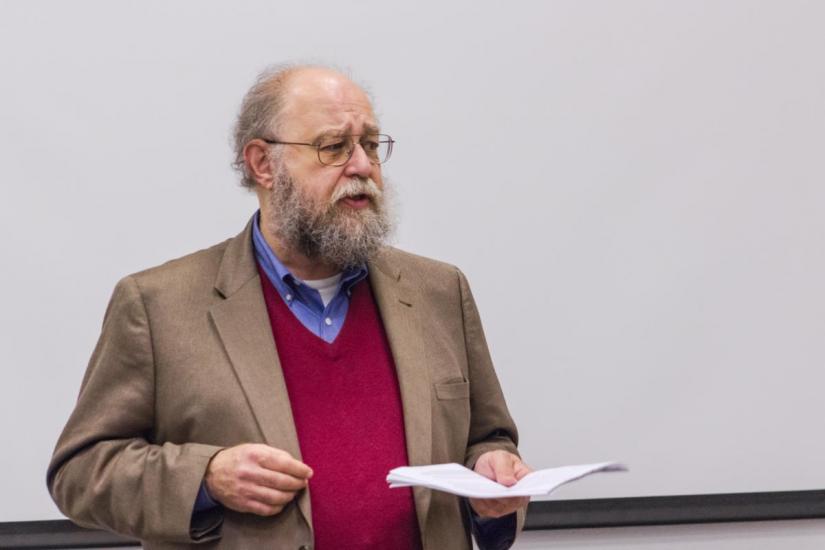
Talk Handout
Some Texts from the Ethics on Consciousness
Daniel Garber (Princeton University)
E1App: …men think themselves free, because they are conscious of their volitions and their
appetite, and do not think, even in their dreams, of the causes by which they are disposed to
wanting and willing, because they are ignorant of [those causes]. [Cf. E2P35S, E3P2S, E4Pref]
E2P11: The first thing that constitutes the actual being of a human Mind is nothing but the idea
of a singular thing which actually exists.
E2P11C: …when we say that the human Mind perceives this or that, we are saying nothing but
that God, not insofar as he is infinite, but insofar as he is explained through the nature of the
human Mind, or insofar as he constitutes the essence of the human Mind, has this or that idea…
E2P12: Whatever happens in the object of the idea constituting the human Mind must be
perceived by the human Mind, or there will necessarily be an idea of that thing in the Mind; i.e.,
if the object of the idea constituting a human Mind is a body, nothing can happen in that body
which is not perceived by the Mind.
E2P13: The object of the idea constituting the human Mind is the Body, or a certain mode of
Extension which actually exists, and nothing else.
E2P13S: …in proportion as a Body is more capable than others of doing many things at once,
or being acted on in many ways at once, so its Mind is more capable than others of perceiving
many things at once, And in proportion as the actions of a body depend more on itself alone,
and as other bodies concur with it less in acting, so its mind is more capable of understanding
distinctly. And from these [truths] we can know the excellence of one mind over the others…
E2P16: The idea of any mode in which the human Body is affected by external bodies must
involve the nature of the human Body and at the same time the nature of the external body.
E2P19: The human Mind does not know the human Body itself, nor does it know that it exists,
except through ideas of affections by which the Body is affected.
Dem.: For the human Mind is the idea itself, or knowledge of the human Body (by E2P13),
which (by E2P9) is indeed in God insofar as he is considered to be affected by another idea of a
singular thing, or because (by Post. 4) the human Body requires a great many bodies by which it
is, as it were, continually regenerated; and [NS: because] the order and connection of ideas is
(by E2P7) the same as the order and connection of causes, this idea will be in God insofar as he
is considered to be affected by the ideas of a great many singular things. Therefore, God has the
idea of the human Body, or knows the human Body, insofar as he is affected by a great many
other ideas, and not insofar as he constitutes the nature of the human Mind, i.e. (by E2P11C),
the human Mind does not know the human Body. But the ideas of affections of the Body are in
God insofar as he constitutes the nature of the human Mind, or the human Mind perceives the
same affections (by E2P12), and consequently (by E2P16) the human Body itself, as actually
Propositiones de conscientia ex Ethica extractae
Daniel Garribor (Academia in Castro Principis)
E1App: …homines, se liberos esse, opinentur, quandoquidem suarum volitionum, sui ue
appetitûs sunt conscii, & de causis, à quibus disponuntur ad appetendum, & volendum, quia
earum sunt ignari, nec per somnium cogitant. [Geb II 78]
E2P11: Primum, quod actuale Mentis humanæ esse constituit, nihil aliud est, quàm idea rei
alicujus singularis actu existentis.
E2P11C: … cùm dicimus, Mentem humanam hoc, vel illud percipere, nihil aliud dicimus,
quàm quòd Deus, non quatenus infinitus est, sed quatenus per naturam humanæ Mentis
explicatur, sive quatenus humanæ Mentis essentiam constituit, hanc, vel illam habet ideam…
E2P12: Quicquid in objecto ideæ, humanam Mentem constituentis, contingit, id ab humanâ
Mente debet percipi, sive ejus rei dabitur in Mente necessariò idea: Hoc est, si objectum ideæ,
humanam Mentem constituentis, sit corpus, nihil in eo corpore poterit contingere, quod à Mente
non percipiatur.
E2P13: Objectum ideæ, humanam Mentem constituentis, est Corpus, sive certus Extensionis
modus actu existens, & nihil aliud.
E2P13S: Hoc tamen in genere dico, quò Corpus aliquod reliquis aptius est ad plura simul
agendum, vel patiendum, eò ejus Mens reliquis aptior est ad plura simul percipiendum; & quò
unius corporis actiones magis ab ipso solo pendent, & quò minùs alia corpora cum eodem in
agendo concurrunt, eò ejus mens aptior est ad distinctè intelligendum. Atque ex his præstantiam
unius mentis præ aliis cognoscere possumus…
E2P16: Idea cujuscunque modi, quo Corpus humanum à corporibus externis afficitur, involvere
debet naturam Corporis humani, & simul naturam corporis externi.
E2P19: Mens humana ipsum humanum Corpus non cognoscit, nec ipsum existere scit, nisi per
ideas affectionum, quibus Corpus afficitur.
Dem: Mens enim humana est ipsa idea, sive cognitio Corporis humani (per Prop. 13. hujus),
quæ (per Prop. 9. hujus) in Deo quidem est, quatenus aliâ rei singularis ideâ affectus
consideratur; vel quia (per Post. 4.) Corpus humanum plurimis corporibus indiget, à quibus
continuò quasi regeneratur; & ordo, & connexio idearum idem est (per Prop. 7. hujus), ac ordo,
& connexio causarum; erit hæc idea in Deo, quatenus plurimarum rerum singularium ideis
affectus consideratur. Deus itaque ideam Corporis humani habet, sive Corpus humanum
cognoscit, quatenus plurimis aliis ideis affectus est, & non quatenus naturam humanæ Mentis
constituit, hoc est (per Coroll. Prop. 11. hujus), Mens humana Corpus humanum non cognoscit.
At ideæ affectionum Corporis in Deo sunt, quatenus humanæ Mentis naturam constituit, sive
Mens humana easdem affectiones percipit (per Prop. 12. hujus), & consequenter (per Prop. 16.